 |
are charismatic
“salesmen”
of concepts, |
but also on the inherent
“contagion” and “stickiness” of the phenomenon
itself, as well as on a nurturing external environment in which to spread.
Countless
convincing case studies and numbers are presented, but the volume sorely
lacks charts to better illustrate the points being made.
Moreover the
book seems to be leading to a kind of
“how to achieve a tipping point” climax, yet it
leaves you frustrated because it never delivers one.
More details
here.

A fascinating book, entertainingly written,
in which an economist delves into the world of global commerce by trying to
trade his way around the world. Starting with £50,000, proceeds from
the sale of his London home, he aims to double this sum in a year of travel.
His endeavours - as many unsuccessful as
not - include trades and exports of camels from Sudan, coffee from Zambia,
chilli from South Africa, horses from Kyrgyzstan, jade across China, tea
from Taiwan. In each case he
attempts to sell his product to the next stop on his journey.
He also wants to test his theory that you
can sell ice to the proverbial Eskimos provided you add some
special angle to your ice.
Does he end up with his £100,000?
You'll have to read the book!
To my astonishment, I've just (16 April
2009) viewed an episode about the adventure on UK's
Channel 4 TV |
![The Boy In The Striped Pyjamas [DVD] [2008]](http://ecx.images-amazon.com/images/I/51XCCCeW2cL._SL500_AA240_.jpg)
A charmingly written, evocative story of a
nine-year old German boy who makes friends with a Polish Jew of the same age
who is confined within Auschwitz. For more than a year they meet
clandestinely, sitting and chatting earnestly, on either side of the wire
fence that encloses the prison and extermination camp
The German boy does not understand that
his friend is a prisoner denied all the privileges that he takes for
granted.
The book is written through the eyes of
the boy and in the charming style of a nine-year-old.
|

King Leopold's Ghost: The Plunder of the Congo
and the Twentieth Century's First Great International Human Rights Movement,
by Adam Hochschild.
Fascinating, wonderfully written, a
page-turner, this book also includes a great
account of Stanley's African adventures.
Above all, it is an appalling exposé of King Leopold
II of the Belgians in his quest to obtain and exploit the Congo. Out of a population of
around twenty million he was responsible
for the deaths of ten million,
not
to mention further millions mutilated through chopping off hands or feet or
genitals (though most of those were already dead.) His use of the
vicious chicotte (rawhide whip) averaged at one stage 12 strokes per
Congolese worker.
In percentage terms, Leopold's murder rate
well exceeds those of fellow-monsters Mao (11%), Stalin (14%), Lenin
(5%), Pol Pot (21%) or Hitler.
Shamefully, however, his brutality was
not unduly different from that perpetrated by the French and the Germans
in Africa, by the British against Australian aborigines or by the
Americans against the Red Indians.
Leopold, personally, made over a
billion dollars in today's money out of the Congo. |
|
2008 (in
reverse order) |
Back to top
of page |

“The
Complex : An insider exposes the covert world of
the Church of Scientology”,
by John DuignanI
bought this book when I learnt that Scientology persuaded Amazon in both
the UK
and
US to cease supplying it. It is however available (for now -
Dec 2008)
in
Ireland.
The exposé does not disappoint.
Scientology is a multinational
organisation which, notwithstanding its claims that we are all immortal
reincarnates from outer space, is dedicated solely to extracting money
from vulnerable people by selling books and courses, all supposedly of a
self-improvement nature but with a significant dose of brainwashing
thrown in, along with suppression of normal human desires and wants.
The
“Church”
does nothing else, but applies ruthless discipline to its members
including
gulag-style punishments.
Members are assigned naval style
ranks and uniforms and work to earn promotion by bringing in ever more
money.
What happens to the money is not
clear, but senior Scientology members enjoy a lavish lifestyle, whilst
most ordinary members are paid a pittance, work 14-hour days, sleep in
dormitories and are fed prison-style food.
It claims to be a
“Church”
because this affords it charitable (ie tax-free) status and minimises
outside scrutiny.
The author was a member for 20
years, rising high in seniority before defecting. Based on what
has happened to other betrayers, his life may well be in danger for
having written this book. |
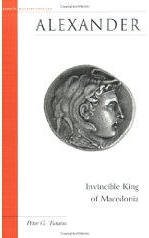
Alexander:
Invincible King of Macedonia
Military historian Peter Tsouras writes a concise (107-page) , pithy account
of the life and military adventures of Alexander the Great, considered by
many as the greatest strategist, tactician, logistician, politician and
diplomat of all time.
In just twelve tumultuous years as king of
Macedonia,
he conquered Eastern Europe, Egypt, Central Asia and much of India, which
was the entire extent of the then known world. He died of fever
(perhaps typhus, or even poisoning) in 323 BC aged only 32.
Though immensely capable and
extraordinarily brave, he comes across as a vainglorious braggart, a
homicidal thug and bully, intensely moody with a volatile temper. In short a
rather unpleasant individual, notwithstanding his occasional magnanimity
towards the vanquished provided they kow-tow to him sufficiently. So I
for one didn't feel sorry for him for having died so young, and was glad it
was of disease without the glory of battle wounds.
Strangely, the author makes no allusion to
Alexander's
renowned homosexuality. Not a single male lover is identified as
such, but his marriages to three women is dutifully recounted. |
|

This is the definitive account of the most
foul human being ever to have walked the earth. No other monster comes
close - not Stalin, not Lenin, not Hitler, not Pol Pot, not Genghis Khan,
not Ivan the Terrible.
The book is meticulously researched,
magnificently structured, beautifully written - and drips innocent Chinese
blood from almost every one of its 971 riveting pages.
Moa Tse Tung was obsessed with simply
killing as many of his countrymen as he could by whatever means in order to
maintain the remainder in such a permanent state of terror that the idea of
turning on him would never even cross their wretched minds.
He also starved peasants
in their hundreds of millions in order to confiscate the food they grew to
pay the Soviets for a gargantuan armaments infrastructure which thankfully
he never achieved.
Most terribly, Mao was absolutely
right. He proved that terror is the most effective way of retaining
power. Too many despots have tried to emulate him, but none with the
same single-minded ferocity.
Disgustingly, people name restaurants in his honour. |

English historian
Charles Foley's
fascinating account of an honourable man who introduced the concept of
Special Forces to the German military during World War 2.
In that role, as Hitler's trusted
operative, he recounts much derring-do, such as rescuing Mussolini from
mountain top captivity, bluffing the then Hungarian strongman into
surrendering, wreaking covert havoc on the Allied invasion of France.
Particularly moving is his account,
from the German viewpoint, of the invasion of the Soviet Union and the
stoic, stolid, suicidal resistance of the Russians.
This page-turner of a book concludes
with a forecast of the role of Special Forces in future conflicts, which has
turned out to be surprisingly prescient.
It was written in 1954. |
|
2007
(in reverse order) |
Back to top
of page |
|
|

The purpose of this 500-page novel is
to present in graphic detail the horrors of living, fighting and - above all
- dying in (and under) the trenches during the First World War.
It does so, both commendably and
shockingly. You certainly cannot come away with other than feelings
of deep admiration and sympathy for what those young men endured, not to
mention the distraught families at home, in their tens of thousands, when
the dreaded news of their sons' demise arrived.
But the book is spoilt by the
introduction of a storyline which is sentimental and distracting. Much
of it is frankly boring. You might enjoy the sex which is detailed and
graphic,
but it's unnecessary.
Also, the interminable, repetitive
description, going on for over 40 pages, of being buried alive in a
collapsed tunnel, just ends up being irritating.
About 200 pages should have been edited
out. |

This unapologetic old-style thriller pits a hardened Vietnam veteran
turned mild lawyer
against a ruthless
Serbian warlord.
A rattling yarn across three continents unfolds as the good guy tracks
down the bad guy in his luxurious lair.
Definitely a man's book.
The story is accompanied by enlightened historical cameos describing
aspects of the Vietnam and Yugoslav wars and by bios of major figures from
those conflicts.
Pretty much unputdownable,
these pages are also
a most enjoyable way
to bone up on
recent history. |

“In
Search of Iraq: From Baghdad to Babylon”
by Richard DownesA particularly well-written and
compelling account of the Iraq war,
before during and after the 2003 invasion, as viewed by an Irish journalist.
I expected the strong anti-war bias
typical of most Irish journalism, but found instead great, factual reporting
of what the author saw and heard on the ground in Iraq.
The book also includes excellent
background briefing material,
which provides
historical context
for the vicious
multi-sided conflicts
that followed from the invasion.
|
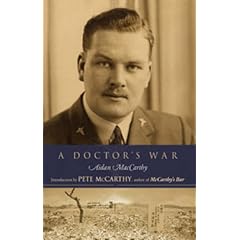
“A
Doctor's War”
by Dr Aiden McCarthyThe wartime
memoir of an RAF volunteer doctor from Cork, who sees action in France,
Dunkirk, Java and Japan.
As a prisoner of war for 3½ years,
he bravely and doggedly faces a Japanese diet of scorn, deprivation and
brutality, whilst seeking opportunities to practice his profession for the
benefit of his fellow-captives.
He is torpedoed, his
ship sunk, is rescued by the Japanese,
leaps overboard again to escape a beating, is rescued again and is very
nearly thrown back into the sea for a third time.
He ends up in Nagasaki
where he survives the atomic bomb and lives to welcome and be rescued by the
Americans in 1945.
Along the road, he
witnesses incredible acts of courage and patriotic self-sacrifice, as well
as understandable savagery, on the part of his fellow prisoners.
Yet his
reflections contain little of rancour for his Japanese captors who treated
him and his colleagues
so abominably.
A lasting impression is
the meticulous planning that went into post-invasion Japan
- in stark contrast to
post-invasion Iraq. |

A rollicking account of the inexactitudes
of modern surgery, the struggle to keep up with the latest technology and
techniques, the impossibility of getting trained and practiced except by
trial and error on live patients, and the cock-ups that occasionally result.
It also wanders into philosophical
discourse on little understood conditions such as nausea, blushing and
overeating.
Yet you end up with a strange
confidence in and admiration for the men and women who cut you up as they do
their level best to improve your life. |

The title tells you nothing
about the book.
It's a series of stories about various
machines and edifices that have caught the author's humorous eye because
they have some mystical quality he calls
“soul”.
They include man-made things as varied as
Riva boats, the Hoover dam, US Nimitz aircraft carriers, the AK-47,
the
Flying Scotsman.
A book that is witty and fascinating
in equal measure,
but only, I suspect,
for males.
|

Alister McGrath, the principal author of
“The
Dawkins
Delusion”,
is an Oxford professor, with a biology background, and as such is of similar
academic standing to atheist proselytizer Richard Dawkins.
Here he vigorously
refutes
“The God Delusion”,
though in a writing style that somewhat lacks
Prof Dawkins'
panache and wit.
Actually it is
thoroughly turgid and heavy going, which detracts from its argumentation.
Professor McGrath
should take
writing lessons from Professor Dawkins!
|
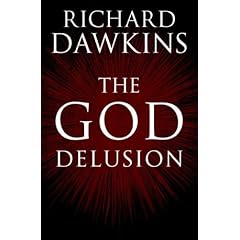
Richard Dawkins, who has made a career out of being an articulate atheist,
sets out his case for declaring that God is no more than
a human delusion.
It is elegantly written
and carefully argued, but overly reliant on strawmen, distortion, mockery
and sarcasm to disparage religious belief.
I have written a review,
“The
Dawkins Delusion”.
You can also
listen to David Quinn's forensic evisceration of
the author
as from Minute 8
of this
audio clip.
|
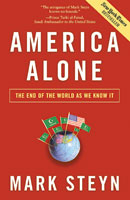
This is Steyn's brilliant latest
tome which seems to have evolved out his seminal article
“It's
the Demography, Stupid”.
It warns how
Westerners, other than Americans, are dying out due to low birthrates (1.1
babies per woman), to be replaced by fast-breeding unintegrated Muslim
immigrants and their babies, and their anti-West, anti-gay, anti-woman
sharia ideology.
For older people,
his book is too late. But it is a must-read for young Westerners still
of reproduction age |
|
2006
(in reverse order) |
Back to top
of page |
| April/May 2006 |
May 2006 |
May 2006 |
May 2006 |
|

One of the finest books I've ever encountered.
It reads like a series of quality lectures. You will never gain a
better appreciation of the Cold War, with all its drama and nuances, than
from this utterly compelling volume.
No other document better
explains the extraordinary roles of Margaret Thatcher, Ronald Reagan, Pope
John Paul II - and Mikhail Gorbachev - in ending the Cold War by
destroying the Soviet Union - virtually without a shot being fired.
|

A fascinating account
which uses published SPE
papers, whose fragmented scientific information has never been assembled
in this way, to show that the Saudis have nowhere near the amount of oil
they claim.
However, it underestimates the huge volumes of oil that remain
unexploited because no concerted effort has been conducted to chase the less
profitable reserves. For comparable production levels, the United
States has drilled 100 times more wells.
If the Saudis do that,
they will extend their
oil life enormously,
but at a return of only 1%
of
what they're used to.
But it will only happen if they open up their fields
to international foreign investment
In summary,
correct
reasoning;
wrong conclusion.
See also my review
“Saudi
Arabia's
Fading Oil Reserves”
|

A
very useful, easy to understand guide to Islam, in a readily accessible
question-and-answer format. Don't be put off by its title: it is
equally informative for non-Catholics - indeed non-Christians.
|

Whimsical tale about an English
couple starting a new life on a farm in a remote mountain in Andalucia (a
couple of hours north of Malaga) and getting themselves integrated with
the natives.
Nice easy-going read for holiday
time; makes you a little wistful
|

The title says it all: Because Europeans
are sleepwalking through the momentous events unfolding around them, Islam
is gradually regaining - and extending - the European Caliphate it was ejected from centuries
ago.
The author's key paragraph ...
“In the end, Europe's enemy is not Islam,
or even radical Islam. Europe's enemy is itself - its self-destructive
passivity, its softness toward tyranny, it's reflexive inclination to
appease, and its uncomprehending distaste for America's pride, courage, and
resolve in the face of a deadly foe. ”
Scary. |

Ayaan Hirsi Ali explains what it's like to
be a Muslim woman and how Islam needs its own Enlightenment.
She also shows how the
suppression of women not only removes 50% of Muslim populations as a
potential source for growth and development, but grievously hobbles the
development of menfolk as well. Ignorant mothers raise ignorant sons.
This slim volume should
be every right-thinking feminist's handbook. |

Prior to his ascendancy as Iran's
theocrat-in-chief in 1979, a loin-obsessed cleric
sets out his bizarre rules for urinating, defecating, eating, women, sex by
men (with wives, Jews, mistresses, other men, children, camels, whatever) and
other key features of Islamic theocracy.
More Khomeinistic
marital enlightenment
here |

A man with a passion for bad cricket goes with his pals on a world
cricketing tour - which includes Antarctica |

The only man ever to have escaped from
North Korea and to have described a slave-labour camp, the author spent his
formative years, from 9 to 19, in Yodok
because his grandfather was deemed
an enemy of the state.
Because he knows what an
authoritarian regime is really like, he loves George W Bush.
This is a very well
constructed narrative, in remarkably readable, idiomatic English, especially
considering it has been translated from Korean to French to English.
Unputdownable.
George W Bush read this
book and immediately invited the author to the White House. |

Instapunditeer
Glen Reynolds sets out his theory that in today's world, ordinary people (Davids)
armed with the latest technology (slings) can take on the pros (Goliaths) on
their own turf - and beat them.
This is all very
uplifting if you're a blogger.
But then the book
degenerates in the last quarter to lot of unreadable old waffle about
spaceships and other rubbish.
|
|

Craig Murray,
British ambassador to Uzbekistan 2002-04, exposes that country's human
rights abuses
and as a result gets squeezed out of his job by an embarrassed British
Government.
This is a superb yet
shocking book, even though it is
anti George Bush's
war on terror and is accoladed by John Pilger.
Its virtue lies not only in what it tells us
about Uzbekistan's vile tyrannical regime (and indeed Uzbekistan
itself), but in the
fast-paced, witty, honest manner in which
he tells his story.
Borat
should have been created as an Uzbek not a Kazhak. |

Mark Steyn autographed and sent me
this book for winning his
Letter of the Week
in November 2005.
I'm late in reading it,
but it is a rollicking collection of his inimitable columns written during
his first year of self-proclaimed
“Jihad 24/7”,
after the attacks of 911.
Readable and wise,
as he always is.
|
Imperial Ambitions: Conversations
with Noam Chomsky
on the Post-9/11 World
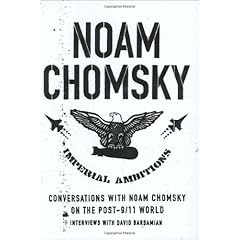
|
|
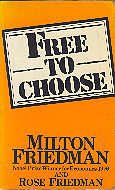 |
Back to top
of page
|
|
 |
|
Gift Idea
Cuddly Teddy Bears
looking for a home
Click for details
“” |
|


Neda Agha Soltan;
shot dead in Teheran
by Basij militia |

Good to report that as at
14th September 2009
he is at least
alive.
FREED AT LAST,
ON 18th OCTOBER 2011,
GAUNT BUT OTHERWISE REASONABLY HEALTHY |
|
 |
|
 |
|
BLOGROLL
Adam Smith
Alt
Tag
Andrew
Sullivan
Atlantic Blog (defunct)
Back Seat
Drivers
Belfast
Gonzo
Black Line
Blog-Irish (defunct)
Broom of Anger
Charles Krauthammer
Cox and Forkum
Defiant
Irishwoman
Disillusioned Lefty
Douglas Murray
Freedom
Institute
Gavin's Blog
Guido Fawkes
Instapundit
Internet Commentator
Irish
Blogs
Irish Eagle
Irish
Elk
Jawa
Report
Kevin
Myers
Mark
Humphrys
Mark Steyn
Melanie
Phillips
Not
a Fish
Parnell's
Ireland
Rolfe's
Random Review
Samizdata
Sarah
Carey / GUBU
Sicilian
Notes
Slugger O'Toole
Thinking Man's Guide
Turbulence
Ahead
Victor Davis Hanson
Watching Israel
Wulfbeorn, Watching

Jihad
Terrorism
Awareness Project
Religion
Iona Institute
Skeptical Bible
Skeptical Quran
Leisure
Razzamatazz
Blog
Sawyer
the Lawyer
Tales from Warri
Twenty
Major
Graham's Sporting Wk
Blog Directory
Eatonweb
Discover the
World
My Columns in the
|
|
What I've recently
been reading

“The Lemon Tree”, by Sandy
Tol (2006),
is a delightful novel-style history of modern Israel and Palestine told
through the eyes of a thoughtful protagonist from either side, with a
household lemon tree as their unifying theme.
But it's not
entirely honest in its subtle pro-Palestinian bias, and therefore needs
to be read in conjunction with an antidote, such as

See
detailed review
+++++

This examines events which led to BP's 2010 Macondo blowout in
the Gulf of Mexico.
BP's ambitious CEO John Browne expanded it through adventurous
acquisitions, aggressive offshore exploration, and relentless
cost-reduction that trumped everything else, even safety and long-term
technical sustainability.
Thus mistakes accumulated, leading to terrifying and deadly accidents in
refineries, pipelines and offshore operations, and business disaster in
Russia.
The Macondo blowout was but an inevitable outcome of a BP culture that
had become poisonous and incompetent.
However the book is gravely compromised by a
litany of over 40 technical and stupid
errors that display the author's ignorance and
carelessness.
It would be better
to wait for the second (properly edited) edition before buying.
As for BP, only a
wholesale rebuilding of a new, professional, ethical culture will
prevent further such tragedies and the eventual destruction of a once
mighty corporation with a long and generally honourable history.
Note: I wrote
my own reports on Macondo
in
May,
June, and
July 2010
+++++

A horrific account
of:
 |
how the death
penalty is administered and, er, executed in Singapore,
|
 |
the corruption of
Singapore's legal system, and |
 |
Singapore's
enthusiastic embrace of Burma's drug-fuelled military dictatorship |
More details on my
blog
here.
+++++

This is
nonagenarian Alistair Urquhart’s
incredible story of survival in the Far
East during World War II.
After recounting a
childhood of convention and simple pleasures in working-class Aberdeen,
Mr Urquhart is conscripted within days of Chamberlain declaring war on
Germany in 1939.
From then until the
Japanese are deservedly nuked into surrendering six years later, Mr
Urquhart’s tale is one of first discomfort but then following the fall
of Singapore of ever-increasing, unmitigated horror.
After a wretched
journey Eastward, he finds himself part of Singapore’s big but useless
garrison.
Taken prisoner when Singapore falls in
1941, he is, successively,
 |
part of a death march to Thailand,
|
 |
a slave labourer on the Siam/Burma
railway (one man died for every sleeper laid), |
 |
regularly beaten and tortured,
|
 |
racked by starvation, gaping ulcers
and disease including cholera, |
 |
a slave labourer stevedoring at
Singapore’s docks, |
 |
shipped to Japan in a stinking,
closed, airless hold with 900 other sick and dying men,
|
 |
torpedoed by the Americans and left
drifting alone for five days before being picked up, |
 |
a slave-labourer in Nagasaki until
blessed liberation thanks to the Americans’ “Fat Boy” atomic
bomb. |
Chronically ill,
distraught and traumatised on return to Aberdeen yet disdained by the
British Army, he slowly reconstructs a life. Only in his late 80s
is he able finally to recount his dreadful experiences in this
unputdownable book.
There are very few
first-person eye-witness accounts of the the horrors of Japanese
brutality during WW2. As such this book is an invaluable historical
document.
+++++

“Culture of Corruption:
Obama and His Team of Tax Cheats, Crooks, and Cronies”
This is a rattling good tale of the web
of corruption within which the American president and his cronies
operate. It's written by blogger Michele Malkin who, because she's both
a woman and half-Asian, is curiously immune to the charges of racism and
sexism this book would provoke if written by a typical Republican WASP.
With 75 page of notes to back up - in
best blogger tradition - every shocking and in most cases money-grubbing
allegation, she excoriates one Obama crony after another, starting with
the incumbent himself and his equally tricky wife.
Joe Biden, Rahm Emmanuel, Valerie Jarett,
Tim Geithner, Lawrence Summers, Steven Rattner, both Clintons, Chris
Dodd: they all star as crooks in this venomous but credible book.
ACORN, Mr Obama's favourite community
organising outfit, is also exposed for the crooked vote-rigging machine
it is.
+++++

This much trumpeted sequel to
Freakonomics is a bit of disappointment.
It is really just
a collation of amusing
little tales about surprising human (and occasionally animal) behaviour
and situations. For example:
 |
Drunk walking kills more people per
kilometer than drunk driving. |
 |
People aren't really altruistic -
they always expect a return of some sort for good deeds. |
 |
Child seats are a waste of money as
they are no safer for children than adult seatbelts. |
 |
Though doctors have known for
centuries they must wash their hands to avoid spreading infection,
they still often fail to do so. |
 |
Monkeys can be taught to use washers
as cash to buy tit-bits - and even sex. |
The book has no real
message other than don't be surprised how humans sometimes behave and
try to look for simple rather than complex solutions.
And with a final
anecdote (monkeys, cash and sex), the book suddenly just stops dead in
its tracks. Weird.
++++++

A remarkable, coherent attempt by Financial Times economist Alan Beattie
to understand and explain world history through the prism of economics.
It's chapters are
organised around provocative questions such as
 |
Why does asparagus come from Peru? |
 |
Why are pandas so useless? |
 |
Why are oil and diamonds more trouble
than they are worth? |
 |
Why doesn't Africa grow cocaine? |
It's central thesis
is that economic development continues to be impeded in different
countries for different historical reasons, even when the original
rationale for those impediments no longer obtains. For instance:
 |
Argentina protects its now largely
foreign landowners (eg George Soros) |
 |
Russia its military-owned
businesses, such as counterfeit DVDs |
 |
The US its cotton industry
comprising only 1% of GDP and 2% of its workforce |
The author writes
in a very chatty, light-hearted matter which makes the book easy to
digest.
However it would
benefit from a few charts to illustrate some of the many quantitative
points put forward, as well as sub-chaptering every few pages to provide
natural break-points for the reader.
+++++

This is a thrilling book of derring-do behind enemy lines in the jungles
of north-east Burma in 1942-44 during the Japanese occupation.
The author was
a member of Britain's V Force, a forerunner of the SAS. Its remit was to
harass Japanese lines of
command, patrol their occupied territory, carryout sabotage and provide
intelligence, with the overall objective of keeping the enemy out of
India.
Irwin
is admirably yet brutally frank, in his
descriptions of deathly battles with the Japs, his execution of a
prisoner, dodging falling bags of rice dropped by the RAF, or collapsing
in floods of tears through accumulated stress, fear and loneliness.
He also provides some fascinating insights into the mentality of
Japanese soldiery and why it failed against the flexibility and devolved
authority of the British.
The book amounts to
a very human and exhilarating tale.
Oh, and Irwin
describes the death in 1943 of his colleague my uncle, Major PF
Brennan.
+++++
Other books
here |
|

Click for an account of this momentous,
high-speed event
of March 2009 |
|

Click on the logo
to get a table with
the Rugby World Cup
scores, points and rankings.
After
48
crackling, compelling, captivating games, the new World Champions are,
deservedly,
SOUTH AFRICA
England get the Silver,
Argentina the Bronze. Fourth is host nation France.
No-one can argue with
the justice of the outcomes
Over the competition,
the average
points per game = 52,
tries per game = 6.2,
minutes per try =
13 |
|

Click on the logo
to get a table with
the final World Cup
scores, points, rankings and goal-statistics |
|
 |
| 













![The Boy In The Striped Pyjamas [DVD] [2008]](http://ecx.images-amazon.com/images/I/51XCCCeW2cL._SL500_AA240_.jpg)
































